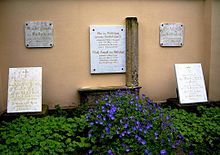Ida von Lüttichau
Ida von Lüttichau (born May 30, 1798 in Sellin / Neumark , † February 1, 1856 in Dresden ) was a German patroness and artist.
Life

Ida von Lüttichau was born as the daughter of the Royal Prussian head stable master Christoph von Knobelsdorff . She received a varied and profound private education in languages, literature, philosophy, painting and music. In 1818 she married Wolf Adolf August von Lüttichau , who from 1824 became General Director of the Royal Saxon Court Theater in Dresden.
She successfully advocated the appointment of the poet Ludwig Tieck as dramaturge at the court theater and subsequently belonged to his literary circle. Ida von Lüttichau came into close contact with many artists, scientists and intellectual greats of her time, such as Carl Maria von Weber , Karl Friedrich Schinkel , Friedrich von Raumer (with whom she was close friends for over 20 years), Sarah Austin , Felix Mendelssohn Bartholdy , Dorothea Tieck , Adelheid Reinbold , Ida Countess Hahn-Hahn , Giacomo Meyerbeer , Karl Gutzkow , Bernhard von Lindenau , and Johann Wilhelm Löbell . The polymath Carl Gustav Carus , with whom she developed an intense spiritual relationship, became her personal physician from 1844.
Ida von Lüttichau had a great influence on the work of her husband as general manager of the Royal Saxon musical band and the court stage. Among other things, she supported him in the selection of plays and the employment of new members in the chapel and theater. In 1830 she and her husband built the Palais Lüttichau , which they also lived in. Richard Wagner dedicated his opera Der Fliegende Holländer, which premiered in Dresden in 1843, to Ida von Lüttichau .
Ida von Lüttichau died of a stroke and was buried in the Trinity cemetery in Dresden . Ernst Rietschel created a bust of her shortly after her death .
meaning
Ida von Lüttichau pursued philosophical, psychological and religious studies for her entire life, recorded her reflections on diary sheets and in thought books, made excerpts from books in different languages and conducted extensive correspondence. The apparently unanimous high esteem of contemporaries is evident in testimonials. However, she consistently refused her own publications. Most of the letters she wrote (or those of her correspondents) have not yet been found. Her thought books are in the Goethe and Schiller Archives .
- “In Ida v. Lüttichau's notes show shy, tentative reflection and formulation, which, however, hardly comes from a lack of inner clarity, rather from the constant effort to be mindful of the finest vital impulses in oneself and others. It was about the nuances, because only there she saw the truth of the soul - not in dichotomous definitions. Her, in spite of all her cautiousness, deep certainty about her own feelings and assessments distinguishes her social mindfulness from that one-sided attention oriented towards the opposite, as it may belong to the traditional role of women. - Ida was based on an almost Buddhist attitude of becoming and passing away, of the constant metamorphosis of the material as well as all intellectual knowledge. "
The family grave of Ida and Wolf Adolf August von Lüttichau in the Trinity cemetery was extensively restored in 2012. There are plans to name a street in Dresden's old town to Ida von Lüttichau.
literature
- Mondrian Count v. Lüttichau / Petra Bern (ed.): Truth of the soul - Ida v. Liège (1798-1856). First volume (= contributions to the family history of the lords, barons and counts v. Lüttichau, 3rd part, 3rd part volume), Leipzig 2010 / 2nd edition Berlin 2017 ISBN 978-3-945980-12-5 pdf
- Mondrian Count v. Lüttichau / Petra Bern (ed.): Truth of the soul - Ida v. Liège (1798-1856). Supplementary volume (= contributions to the family history of the lords, barons and counts v. Lüttichau, 3rd part, 4th part volume), Berlin 2015 ISBN 978-3-923211-40-1 pdf
- Ludwig Tieck and Ida von Lüttichau in their letters . Edited by Otto Fiebiger . Dresden 1937 (Announcements from the Society for the History of Dresden, Issue 32)
Web links
- Entries in the database of the Goethe and Schiller Archive Weimar on Ida von Lüttichau
- Short biography and picture of Ida von Lüttichau ( Ulbersdorf / Saxony)
- Frauenwiki-dresden.de: Ida von Lüttichau
- Mondrian Wolfgang Graf von Lüttichau: Ida von Lüttichau . In: Institute for Saxon History and Folklore (Ed.): Saxon Biography .
Individual evidence
- ↑ Mondrian von Lüttichau, in: Truth of the Soul - Ida von Lüttichau (Leipzig / Berlin 2010, page 12)
- ↑ State capital Dresden (ed.): Street names - purely men's business? pdf
| personal data | |
|---|---|
| SURNAME | Lüttichau, Ida von |
| ALTERNATIVE NAMES | Knobelsdorff, Ida von (maiden name) |
| BRIEF DESCRIPTION | German patroness and artist |
| DATE OF BIRTH | May 30, 1798 |
| PLACE OF BIRTH | Sellin , Neumark |
| DATE OF DEATH | February 1, 1856 |
| Place of death | Dresden |
